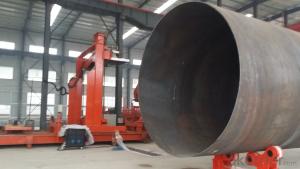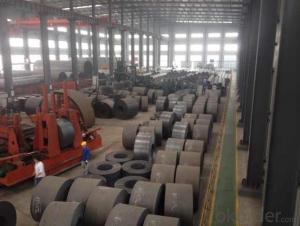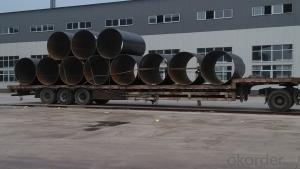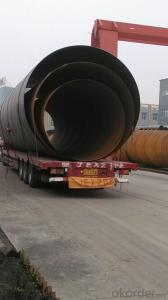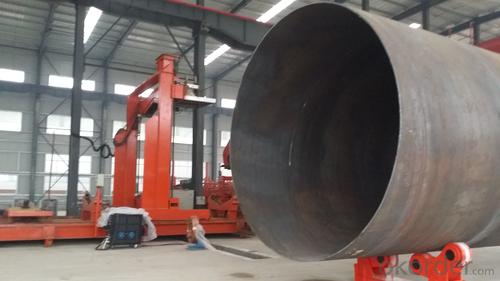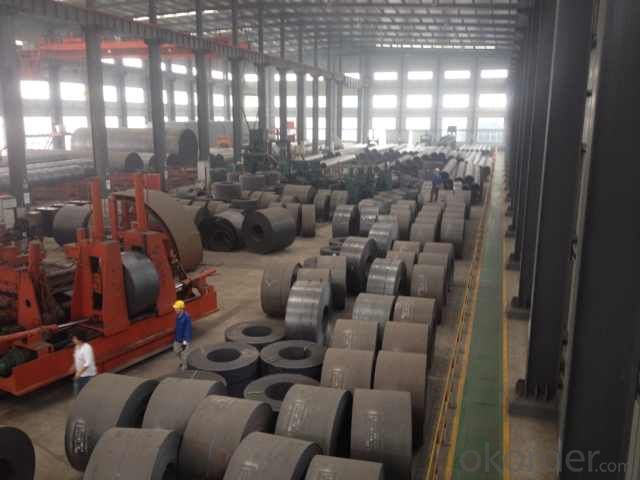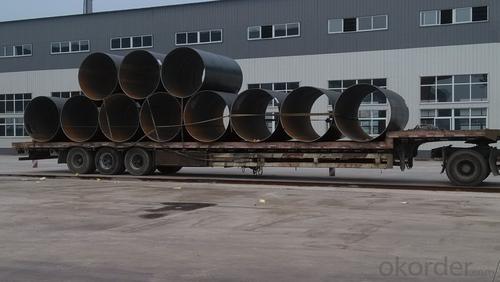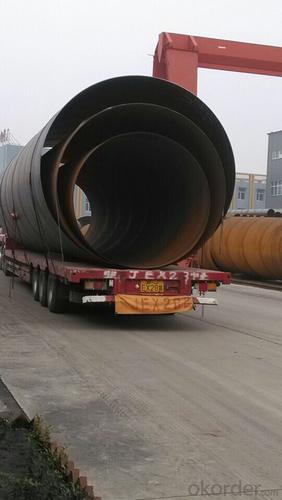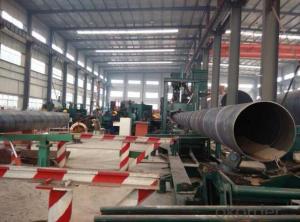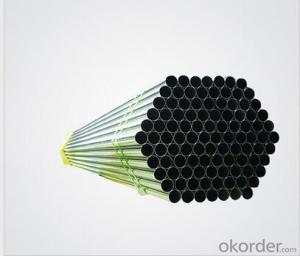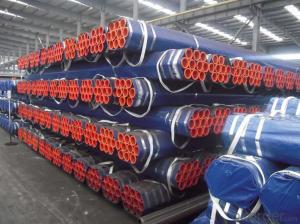SSAW STEEL PIPE 219-3920MM ASTM A106
- Loading Port:
- China Main Port
- Payment Terms:
- TT OR LC
- Min Order Qty:
- -
- Supply Capability:
- -
OKorder Service Pledge
OKorder Financial Service
You Might Also Like
Packaging & Delivery
Packaging Detail: | standard export packing or as customer's requirement |
Delivery Detail: | within 10 - 30 days |
Specifications
Spiral Welded Steel Pipes and Tubes
1.Material:Q195-Q235
2.Length:1-12m
3.WT:1.0-14mm
4.O.D.:219-3920mm
Product Description:
1.Material : Q235,Q345,L245,L290,L360,L415,L450,L485,GrB,X42,46,X52,X56,X60,X65,X70,X80,X100
2,Standard: SY/T5037-2000,GB/T9711-2011,API Spec 5L PSL1/PSL2,ASTM A252\A53,ISO3183,DIN17172,EN10217,JIS G3457,AWWA C200,ASTM A139,ASTM A671,ASTM A672
3.Wall thickness: 3.0mm-30mm
4.Outer diameter: φ219mm-3920mm
5,Length: 5m-12m or as customer requirement
6,Corrosion protection standard: DIN30670,DIN30671, AWWAC210, AWWA C203, SY/T0413-2002,SY/T0414-2002
7,Application: Oil, gas, natural gas, water pipe, thermal electricity pipe, steel structure engineering, etc
Q195-Q345 Material Steel Pipe's Materials
Elements | Chemical Compsition% | Mechanical Property | ||||||
| C% | Mn% | S% | P% | Si% | Yield Point (Mpa) | Tensile Strength(Mpa) | Elongation |
Q195 | 0.06-0.12 | 0.25-0.50 | <0.050 | <0.045 | <0.030 | >195 | 315-430 | 32-33 |
Q215 | 0.09-0.15 | 0.25-0.55 | <0.05 | <0.045 | <0.030 | >215 | 335-450 | 26-31 |
Q235 | 0.12-0.20 | 0.30-0.70 | <0.045 | <0.045 | <0.030 | >235 | 375-500 | 24-26 |
Q345 | <0.20 | 1.0-1.6 | <0.040 | <0.040 | <0.55 | >345 | 470-630 | 21-22 |
- Q: What are the different methods of pipe lining for steel pipes?
- Some of the different methods of pipe lining for steel pipes include slip lining, cured-in-place pipe lining (CIPP), pipe bursting, and sliplining. Slip lining involves inserting a smaller diameter pipe into the existing steel pipe, while CIPP involves inserting a resin-impregnated liner into the pipe and curing it in place. Pipe bursting involves breaking the existing steel pipe and replacing it with a new pipe, while sliplining involves inserting a new pipe into the existing steel pipe without breaking it.
- Q: How are steel pipes used in the construction of offshore oil rigs?
- Steel pipes are used in the construction of offshore oil rigs for various purposes. They are primarily used for drilling and extracting oil from deep-sea wells. These pipes are durable and able to withstand harsh offshore conditions, making them ideal for transporting oil and gas from the wells to the surface. Additionally, steel pipes are used in the construction of the rig's infrastructure, including the installation of risers, production lines, and various subsea systems. Overall, steel pipes play a crucial role in ensuring the functionality and integrity of offshore oil rigs.
- Q: Difference between cold rolled steel pipe and common steel pipe
- 3, the caliber of cold-rolled steel tube is smaller than that of hot rolled steel tube4, from the price point of view, cold-rolled steel pipe is 1000-2000 tons more expensive than hot-rolled steel pipe
- Q: What is the size of seamless steel tube DN150?
- Seamless steel pipe having a hollow cross section, used as a conduit for conveying fluids, such as pipelines for transporting petroleum, natural gas, gas, water, and certain solid materials. Compared withsteel and roundsteelinsolid, flexural torsional strength in the same time, the weight is light, is a kind of economic section steel, widely used in the manufacture of structural parts and mechanical parts, such as the oil pipe, automobile transmission shaft, the bicycle frame and steel construction with scaffold with steel pipe manufacturing ring parts can be improved the utilization rate of materials, simplify the manufacturing process, material saving and working hours, has been widely used to manufacture steel tube.
- Q: Can steel pipes be used for oil refinery applications?
- Yes, steel pipes can be used for oil refinery applications. Steel pipes offer many advantages for oil refinery applications including high strength, durability, and resistance to corrosion. They are able to withstand high pressure and temperature conditions that are common in oil refinery operations. Steel pipes are also easy to transport and install, making them a popular choice for oil refinery projects. Additionally, steel pipes can be customized to meet specific requirements such as size, thickness, and coating, making them suitable for a wide range of oil refinery applications.
- Q: How do you calculate the buoyancy of submerged steel pipes?
- To calculate the buoyancy of submerged steel pipes, you need to determine the weight of the displaced fluid. This can be done by multiplying the volume of the submerged portion of the pipe by the density of the fluid. The buoyant force is then equal to the weight of the displaced fluid.
- Q: What is the difference between internal lining and external coating of steel pipes?
- The difference between internal lining and external coating of steel pipes lies in their respective purposes and locations. Internal lining refers to the material applied inside the steel pipes to protect the inner surface from corrosion, abrasion, or other forms of damage. It acts as a barrier between the transported fluids or substances and the steel pipe, preventing them from coming into direct contact and causing deterioration. The internal lining is typically made of materials like epoxy, polyethylene, or cement mortar, depending on the specific requirements and the nature of the transported substances. It ensures the longevity and integrity of the steel pipe by reducing the chances of internal corrosion and minimizing the risk of contamination. External coating, on the other hand, is applied to the outer surface of the steel pipes. Its main purpose is to provide protection against external factors such as weathering, soil corrosion, and mechanical damage. The external coating acts as a shield, safeguarding the steel pipe from environmental conditions like moisture, UV radiation, chemicals, and physical impact. Common materials used for external coatings include fusion-bonded epoxy, polyethylene, polypropylene, or bitumen. The choice of coating depends on factors like the exposure conditions, temperature, and the type of soil or surroundings the steel pipe will encounter. In summary, while internal lining protects the inner surface of steel pipes from corrosion and damage caused by transported substances, external coating acts as a barrier against external elements and physical stresses. Both internal lining and external coating play vital roles in ensuring the durability and reliability of steel pipes in various applications, such as oil and gas pipelines, water supply systems, or industrial processes.
- Q: How are steel pipes used in the manufacturing of hydraulic systems?
- Steel pipes are commonly used in the manufacturing of hydraulic systems due to their durability, strength, and resistance to high pressures. These pipes are typically used to transport hydraulic fluid, providing a reliable and leak-free connection between various components such as pumps, valves, and actuators. Steel pipes also offer the advantage of being able to withstand harsh operating conditions and ensure efficient fluid flow, making them an essential component in hydraulic system manufacturing.
- Q: Can steel pipes be used for power plant construction?
- Steel pipes are indeed suitable for power plant construction. They find wide usage in power plants for multiple purposes, including steam, water, and air/gas piping. Their strength, durability, and capacity to endure high temperatures and pressures make them highly recommended. Moreover, steel pipes possess exceptional resistance to corrosion, a crucial factor in power plant settings where various fluids and gases are transported. Furthermore, their easy weldability permits efficient installation and maintenance. In conclusion, steel pipes emerge as a dependable and economical option for constructing power plants.
- Q: Can steel pipes be used for fencing?
- Yes, steel pipes can be used for fencing. They are a popular choice for fencing due to their strength, durability, and ability to withstand harsh weather conditions. Steel pipes provide a sturdy and secure barrier, making them suitable for various fencing applications such as residential, commercial, and industrial settings.
Send your message to us
SSAW STEEL PIPE 219-3920MM ASTM A106
- Loading Port:
- China Main Port
- Payment Terms:
- TT OR LC
- Min Order Qty:
- -
- Supply Capability:
- -
OKorder Service Pledge
OKorder Financial Service
Similar products
Hot products
Hot Searches
Related keywords
